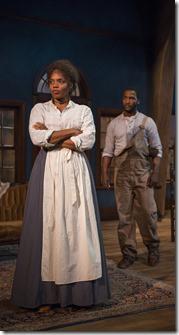
Gem of the Ocean
Written by August Wilson
Court Theatre, 5535 S. Ellis (map)
thru Oct 11 | tix: $45-$65 | more info
Check for half-price tickets
’Gem’ delivers vital parallels to the present
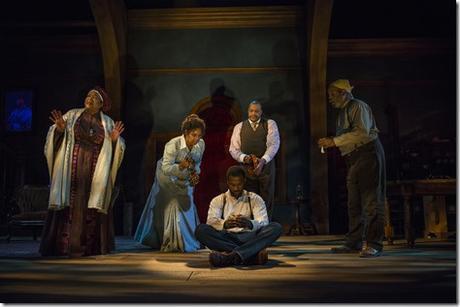
Court Theatre presents
Gem of the Ocean
Review by Lawrence Bommer
Not all August Wilson’s dramas are created equal. Gem of the Ocean, the ninth installment in the late master’s decade-by-decade chronicle of African-American life in the 20th century, may drive you back to Ma Rainey’s Black Bottom and Seven Guitars. You’ll wish to recall a powerful playwright who didn’t need to preach to persuade and who trusted his characters enough not to reduce them to strutting symbols. Instead, Gem, a magnificent 150-minute mess, burdens us, like The Piano Lesson and King Hedley II, with plot holes, supernatural twaddle, rhetorical bombast, rampant religiosity, and acres of aphorisms. All it lacks is blood and breath. Length is not enough.
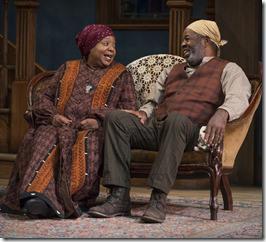
Of course, even lesser August Wilson delivers potent poetry and colorful conversation, scenes that, like his beloved centuries-old Aunt Ester, wash souls and carry memories. At Court Theatre that’s quite enough for Ron OJ Parson’s pile-driving ensemble to turn into thrilling if static stage pictures. They’re deep in Wilson country–Pittsburgh’s Hill District, 1904. A new sort of slavery has been set up by a greedy, selfish sheriff named Caesar (there’s subtlety!), a landlord from hell. Played by David Alan Anderson with everything but the twirling mustache, this villain charges exorbitant rent, evicts on a whim, then has the ejected family locked up for loitering. He stands for the law; everyone else represents the heart. You get it.
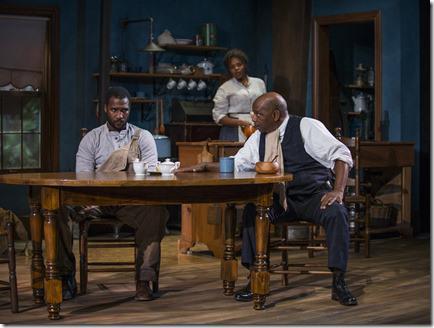
Opposing Caesar is Aunt Ester’s plucky household (dwelling, in Jack Magaw’s design, in a vast but cozy mansion). These are scoundrel Caesar’s saintly sister Black Mary (Tyla Abercrumbie) who toils as a laundress and keeps things real; a young Alabama emigrant and future freedom-fighter (Jerod Haynes) who must atone for the theft of a box of nails; a white peddler (Steve Schine) who serves no particular purpose; the noble ex-slave Eli (A.C. Smith) who lives to remember; and a rambunctious dog-shit vendor named Solly Two Kings (wonderful Alfred H. Wilson) who’s into industrial sabotage. A former Union Army scout and rescuer of runaway slaves, Solly implausibly burns down the tin mill, putting thousands of his fellow blacks out of work. But to Wilson it’s only a metaphor for fighting the new slavery and carries no more moral weight than the mumbo jumbo from Aunt Ester.
As ancient as slavery, Ester (a crusty but considerable Felicia P. Fields, happily never as irritatingly beatific as the role is written) is a 285-year-old earth mother and conjure woman who exists to trick sinners into coming clean. When she doesn’t have a truism on everything, she conducts therapeutic seances where communicants take a doomed slave ship from the Middle Passage to a City of Bones in the middle of the ocean. (You’d be astonished at how literally the play takes this self-inflated surrealism.) Where, I ask unrhetorically, is the Wilson who wrote Fences, where a father and son fought over real issues in an actual backyard? Here you get terrific performances lifting a dazzling-to-sententious script that’s drunk on its own metaphors and intoxicated with empty gestures.
Rating: ★★★
Gem of the Ocean continues through October 11th at Court Theatre, 5535 S. Ellis (map), with performances Wednesdays and Thursdays at 7:30pm, Fridays 8pm, Saturdays 3pm and 8pm, Sundays 2:30pm and 7:30pm. Tickets are $45-$65, and are available by phone (773-753-4472) or online through their website (check for half-price tickets at Goldstar.com). More information at CourtTheatre.org. (Running time: 2 hours 30 minutes, includes an intermission)
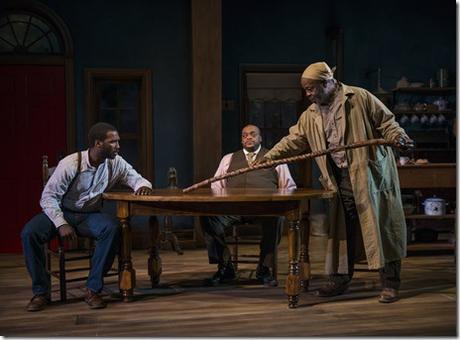
Photos by Michael Brosilow
artists
cast
Tyla Abercrumbie (Black Mary), David Alan Anderson (Caesar Wilks), Felicia P. Fields (Aunt Ester), Jerod Haynes (Citizen Barlow), A.C. Smith (Eli), Alfred H. Wilson (Solly Two Kings), Steve Schine (Rutherford Selig)
behind the scenes
Ron OJ Parson (director), Jack Magaw (set design), Linda Roethke (costume design), Heather Gilbert (lighting design), Christopher Kriz (original music, sound design), Martine Kei Green-Rogers (production dramaturg), Amanda Weener-Frederick (production stage manager), Cara Parrish (assistant stage manager), Michael Brosilow (photos)
15-0937

